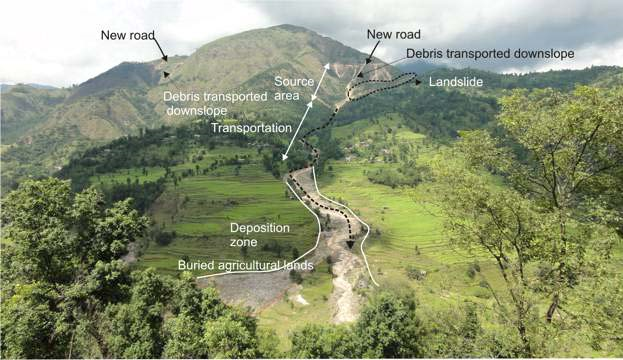Nepali version below
The Ecosystems Protecting Infrastructure and Communities (EPIC) was a global initiative implemented from 2012 to 2017 to promote the use of ecosystem-based approaches and protect communities from disasters and the negative impacts of climate change. It was funded by the German Federal Ministry for the Environment, Nature Conservation, Building and Nuclear Safety (BMUB) through the International Climate Initiative (IKI) and managed by the International Union for Conservation of Nature (IUCN). The project covered seven countries, all relating to a variety of disaster risks and ecosystem types. IUCN Nepal and UNIL-ISTE’s Risk Group co-managed research and field work in Nepal.
The main goal of the EPIC-Nepal project was to catalyze and quantify the role of ecosystems in protecting vulnerable communities against the risks associated with climate change and natural hazards. Its objectives were to:
- Establish demonstration sites for reducing landslide instabilities along road sides using ecosystem-based, locally adapted bioengineering methods;
- Develop capacity building through national and district level workshops that bring together stakeholders from the environmental sector, disaster management, land use planning, development and civil society;
- Advocate ecosystem-based disaster risk reduction at global, national and local levels by influencing policy processes at these various levels.
The publication: “Community-based bio-engineering for Eco-Safe roadsides in Nepal” by Devkota et al. was developed by UNIL-ISTE and IUCN Nepal in 2014 to explain low cost bio-engineering practices for local government communities, roads committees and citizen groups. Ten years later, it has been reprinted multiple times and is still a valuable resource for improving the safety and quality of rural earthen roads in Nepal.
इकोसिस्टम प्रोटेक्टिङ इन्फ्रास्ट्रक्चर एण्ड कम्युनिटीज (EPIC) सन् २०१२ देखि २०१७ सम्म इकोसिस्टममा आधारित दृष्टिकोणको प्रयोगलाई प्रवर्द्धन गर्न र समुदायहरूलाई प्रकोप र जलवायु परिवर्तनका नकारात्मक प्रभावहरूबाट जोगाउनको लागि लागू गरिएको विश्वव्यापी पहल थियो। यो अन्तर्राष्ट्रिय जलवायु पहल (IKI) मार्फत वातावरण, प्रकृति संरक्षण, भवन र आणविक सुरक्षा (BMUB) को लागि जर्मन संघीय मन्त्रालय द्वारा वित्त पोषित थियो र प्रकृति संरक्षण को लागी अन्तर्राष्ट्रिय संघ (IUCN) द्वारा व्यवस्थित गरिएको थियो। परियोजनाले सातवटा देशहरूलाई समेटेको थियो, ती सबै विभिन्न विपद् जोखिम र इकोसिस्टम प्रकारहरूसँग सम्बन्धित छन्। IUCN नेपाल र UNIL-ISTE को जोखिम समूहले नेपालमा अनुसन्धान र क्षेत्रीय कार्यको सह-व्यवस्थापन गरेका छन्।
EPIC-Nepal परियोजनाको मुख्य लक्ष्य जलवायु परिवर्तन र प्राकृतिक प्रकोपसँग सम्बन्धित जोखिमहरूबाट जोखिममा परेका समुदायहरूलाई जोगाउन इकोसिस्टमको भूमिकालाई उत्प्रेरित र परिमाण निर्धारण गर्नु थियो। यसका उद्देश्यहरू थिए:
- इकोसिस्टममा आधारित, स्थानीय रूपमा अनुकूलित बायोइन्जिनियरिङ विधिहरू प्रयोग गरेर सडक छेउमा पहिरोको अस्थिरता कम गर्नका लागि प्रदर्शन साइटहरू स्थापना गर्नुहोस्;
- वातावरणीय क्षेत्र, विपद् व्यवस्थापन, भूउपयोग योजना, विकास र नागरिक समाजका सरोकारवालाहरूलाई एकै ठाउँमा ल्याउने राष्ट्रिय र जिल्ला स्तरका कार्यशालाहरू मार्फत क्षमता विकास गर्ने;
- यी विभिन्न स्तरहरूमा नीति प्रक्रियाहरूलाई प्रभाव पारेर विश्वव्यापी, राष्ट्रिय र स्थानीय स्तरहरूमा पारिस्थितिकी प्रणालीमा आधारित विपद् जोखिम न्यूनीकरणको वकालत गर्नुहोस्।
प्रकाशन: “नेपालमा इको-सेफ रोडसाइडका लागि समुदायमा आधारित बायो-इन्जिनियरिङ्” देवकोटा र अन्य द्वारा। UNIL-ISTE र IUCN Nepal द्वारा 2014 मा स्थानीय सरकार समुदायहरू, सडक समितिहरू र नागरिक समूहहरूको लागि कम लागतको बायो-इन्जिनियरिङ अभ्यासहरू व्याख्या गर्न विकसित गरिएको थियो। दस वर्ष पछि, यो धेरै पटक पुन: छापिएको छ र अझै पनि नेपालमा ग्रामीण माटोको सडकको सुरक्षा र गुणस्तर सुधार गर्नको लागि एक बहुमूल्य स्रोत हो।

